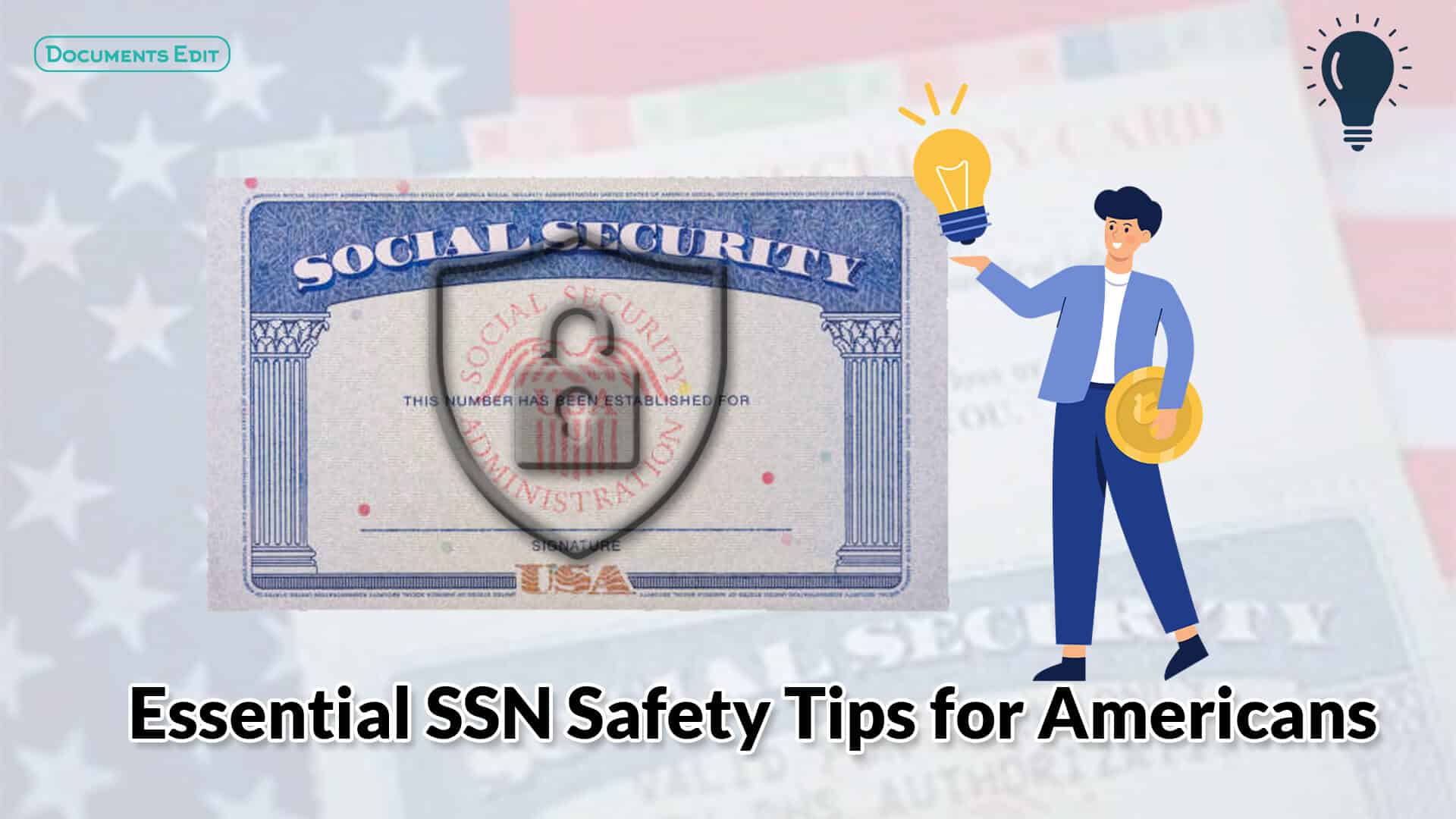Essential SSN Safety Tips for Americans
Did you know over 60 million Americans have had their Social Security numbers exposed in data breaches? This has happened a lot, starting from 2005. With cybercrime and identity theft on the rise, keeping your SSN safe is more important than ever. This guide offers key tips and strategies to protect your sensitive personal info and lower fraud risks.
By following these expert tips, you can actively protect your SSN and personal data. This ensures your identity stays safe in today’s digital world. We’ll cover everything from checking your credit reports to handling sensitive documents. This article is all about keeping your identity secure.
Why SSN Safety Matters
In today’s world, keeping your social security number (SSN) safe is more important than ever. Your SSN is like a key to your identity. If it falls into the wrong hands, it can lead to serious problems like identity theft protection breaches and financial fraud. It’s key to understand how vital personal data security and social security number privacy are to protect yourself.
Consequences of Identity Theft
If your SSN gets into the wrong hands, the damage can be huge. Fraud prevention is a constant fight. Thieves can use your info to get credit cards, loans, or even file taxes in your name. This can ruin your credit, cause financial loss, and take a lot of time to fix.
Rising Risks in the Digital Age
The digital world has brought more data breach prevention threats. Cybercriminals are always looking for ways to steal personal info, like your SSN. From big company data breaches to phishing scams, the risks of identity theft protection are at an all-time high. It’s vital to stay alert and take steps to protect your social security number privacy.
Knowing how serious SSN safety is and the dangers of identity theft can help you protect yourself. By using fraud prevention strategies and cybersecurity measures, you can fight against the growing data breach prevention threats in our digital world.
Safeguarding Your Social Security Number
In today’s digital world, keeping your Social Security number (SSN) safe is key. Your SSN is very personal and can be used for identity theft. So, it’s important to be careful when you share it and take steps to protect it.
Only give out your SSN when you really have to, like for taxes or jobs. Don’t share it unless you have to, even with people you trust. Also, make sure to keep your SSN safe, whether it’s in your wallet or on your computer.
- Never carry your Social Security card with you unless it’s required for a specific purpose.
- Store any documents containing your SSN in a locked drawer or safe, and shred them when no longer needed.
- Carefully review any forms or applications before submitting them to ensure your SSN is not being requested unnecessarily.
In the digital age, protecting your SSN from online dangers is also vital. Avoid sharing your SSN over unsecured email or text messages, and be cautious of phishing scams that may attempt to obtain your personal information. Also, think about using a password manager or other safe ways to keep your SSN data secure.
By taking these steps, you can lower the chance of identity theft and keep your personal data safe. Remember, your SSN is very valuable. Taking good care of it is key to keeping your ssn safety and personal data security strong.
ssn safety: A Proactive Approach
Protecting your Social Security number (SSN) is vital in today’s world. Identity theft and fraud are common. To stay safe, it’s important to be proactive. This means checking your credit reports, watching your financial accounts, and spotting suspicious activity.
One great way to fight identity thieves is to routinely review your credit reports. This helps you find any unauthorized activity or new accounts. You can get free annual credit reports from Experian, Equifax, and TransUnion. Look over them for any odd entries.
- Check your credit reports for any accounts or inquiries you don’t know about.
- Report any identity theft or fraud to the credit bureaus and banks right away.
- Think about signing up for a credit monitoring service for alerts on your credit.
It’s also important to keep an eye on your financial accounts. Look at your bank statements and credit card activity often. This can help you spot any odd transactions or unauthorized access.
- Use strong cybersecurity, like two-factor authentication and complex passwords, to protect your online accounts.
- Watch out for phishing scams and other attempts to get your personal info.
- Consider setting up fraud alerts or credit freezes to protect your SSN and identity.
By being proactive about ssn safety, you can lower the risk of identity theft and fraud. This keeps your financial and personal data safe from cybercriminals. Stay alert, informed, and take steps to protect your Social Security number and personal info.
Monitoring Your Credit Report
Checking your credit report often is key to identity theft protection and personal data security. It helps you spot and fix any fraudulent activity or identity monitoring problems quickly.
Signs of Fraudulent Activity
Look out for these signs of possible identity theft or fraud in your credit report:
- Unfamiliar accounts or inquiries
- Unexpected changes in your credit score
- Unusual address or employment information
- Discrepancies in your personal details
If you see any of these warning signs, act fast to check and fix the problem. Not doing so can harm your finances and credit history.
Being alert and checking your credit report often can lower the chance of identity theft and fraud. This careful approach to personal data security safeguards your financial future and keeps you calm.
Protecting Your Online Presence
In today’s digital world, keeping your personal data safe is key. Cybersecurity is vital to stop data breaches and identity theft. By protecting your online presence, you can control your digital footprint and keep your sensitive info safe.
Start by using strong, unique passwords for all online accounts. Don’t use easy-to-guess info like birthdays or pet names. Consider a password manager to keep complex passwords safe.
Also, turn on two-factor authentication for your accounts. This adds extra protection against unauthorized access. It’s a simple step that can greatly reduce the risk of your social security number being stolen.
Be careful when sharing info online. Don’t share your social security number on social media or in forums. Remember, even small pieces of info can be used by hackers.
Check your online presence and privacy settings often. Watch your social media, email, and other online spots for suspicious activity. Act fast if you spot any issues.
By being proactive, you can lower the risk of data breaches and keep your social security number safe. These steps will help you feel secure online.
Handling Sensitive Documents
In today’s world, keeping your personal data safe is key. Handling sensitive documents right is very important. These can be things like financial statements or medical records that need extra care.
Secure Storage and Disposal
To keep your sensitive documents safe, follow these tips:
- Keep them in a safe, locked spot like a fireproof safe or a locked cabinet. This helps prevent theft or loss.
- Try to digitize important documents and save them in encrypted files. This reduces the risk of physical damage or loss.
- When getting rid of sensitive documents, use a cross-cut shredder to shred them well. This stops others from getting your info.
- Don’t just throw away sensitive documents in the trash. It could lead to personal data security issues and risk your confidential information safeguards.
By following these steps, you can manage your sensitive data well. This helps protect your personal info from misuse or theft.
Identity Theft Protection Services
In today’s digital world, keeping your identity safe is more important than ever. Identity theft can lead to big financial losses, hurt your credit score, and even cause legal problems. Luckily, there are identity theft protection services to keep your personal info safe and help if you’re a victim.
These services offer many features to watch over and protect your identity. They include:
- Identity monitoring – They keep an eye on your personal info to spot any odd activity or misuse.
- Fraud prevention – They send alerts and tools to help you spot and deal with identity theft fast.
- Credit report monitoring – They check your credit reports often to find any signs of fraud.
- Identity restoration assistance – They offer expert help and support to help you take back control if your identity is stolen.
By joining an identity theft protection service, you get peace of mind. You know your personal info is being watched and kept safe. These services are great for people who are more likely to be targeted, like those who are very active online or have sensitive info.
When picking an identity theft protection service, look at a few things. Check how well they cover, how good their customer support is, and what it costs. By choosing a good identity theft protection service, you can protect your identity and lower the chance of falling victim to fraud prevention.
Government Resources and Assistance
The United States government has many resources to help protect your social security number (SSN) and deal with identity theft. These programs are key for keeping your financial and personal info safe. They are designed to help Americans protect their well-being.
The Federal Trade Commission (FTC) is a major source of help. They offer detailed advice on how to prevent and recover from identity theft. Their IdentityTheft.gov website guides you through reporting identity theft and disputing false activity on your credit reports.
- The FTC also runs a National Identity Theft Hotline. You can call them for one-on-one help with identity theft problems.
- The Social Security Administration has tools to protect your SSN. They can help if you think someone is misusing it, including getting a new SSN in some cases.
If you’ve been a victim of identity theft, the U.S. Department of Justice and local police can offer support. They help with filing reports and finding victim assistance programs. These steps can help you get your identity back and fix your financial situation.
Using the government’s identity theft protection and fraud prevention resources can make a big difference. Americans can take steps to protect their personal info and avoid the harm caused by identity theft.
Conclusion
In today’s digital world, keeping your Social Security number (SSN) safe is key. We’ve looked at the dangers of identity theft and how to protect your data. You can check your credit report for odd activity and use identity theft services to keep your SSN safe.
Remember, ssn safety, identity theft protection, and strong personal data security are your main defenses. Stay alert, learn about identity theft, and follow the advice given. This way, you can control your personal info and feel safer online.
Your Social Security number is very important and needs to be guarded. Use the tips from this article to protect your identity. Let’s work together to make a safer future where your personal data stays secure and your finances are safe.






Add comment